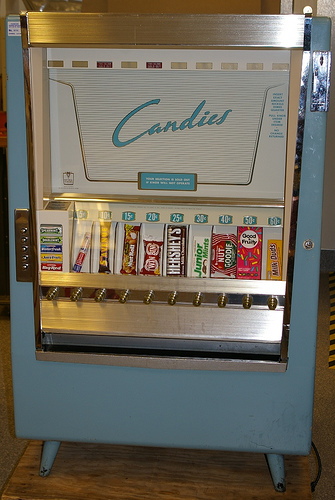How to Write a Thesis: Steps 2–4
Step 2: Narrow the Topic

Source: Working on computer, neetugarcha, Flickr
After you have connected with the topic, you should attempt to narrow it. For standard topics like “junk food in schools,” you can narrow the topic by looking at the list of six questions you wrote.
Could a more restricted topic for junk food in schools be based on the question about whether junk food gives you energy for class? Try rewriting the topic in a more restricted way.
Type your answer using your notes.
Sample Response:
“Junk food as energy source for students in school” is one example of how you could narrow, or restrict, the topic.
CloseFor topics that are based on quotes or on longer texts, the narrowing of the topic is usually a paraphrase. This may take a sentence, or it may take several paragraphs depending on the length of the passage you start with.
For the dog quote from Woodrow Wilson, the narrowed topic could be stated “Woodrow Wilson’s statement that if a dog looks at you and refuses to come, it is a sign that something is wrong with your conscience.”
Step 3: Make the Topic a Question (“Should” or "What if" or "How")
In this lesson, we're going to choose "should" for our persuasive essay. Convert the topic into a question that could be answered “yes” or “no” as shown in these examples:
- Junk food: Should junk food be sold to students during school hours?

Source: Vintage vending machine from the 50s, Minnesota Historical Society, Wikimedia Commons
- Wilson on dogs: Is there any truth in Woodrow Wilson’s statement that we should give dogs credit for being judges of character?
Think of one more question that could be asked about the two topics, junk food or Wilson on dogs.
Type your answers using your notes. When you’re finished, check your understanding.
Sample Response:
There are many questions you could ask. Here are two for each of these topics.
- Junk food: Should machines that sell junk food also have healthier options? Should junk food sales be limited to the cafeteria?
- Wilson on dogs: Is there some truth in Woodrow Wilson’s statement that we should trust a dog’s reaction to our personalities? Should we take seriously Woodrow Wilson’s statement that we should think of dogs as better judges of character than other pets?
Step 4: Take a Position (Provisional Thesis)
Changing the question into a statement of your position is a matter of deciding which side you are on. Not all writing will have only two sides, but for the purposes of this lesson, you will be examining only two. Use the questions you constructed in step three.
The question about junk food, “Should junk food be sold to students during school hours?” becomes a
position statement: “Junk food should not (or should) be sold to students during school hours.”
The question about Wilson on dogs, “Is there some truth in Woodrow Wilson’s statement that dogs are good judges of character?” becomes a position statement: “There is (or isn’t) some truth in Woodrow Wilson’s statement that dogs are good judges of character.”
Change the two questions below into position statements. Type your answers using your notes. When you’re finished, check your understanding.
1. Should machines that sell junk food in schools have healthier options?
2. Should we take seriously Woodrow Wilson’s statement that we can trust a dog’s reaction to our personalities?
Sample Response:
- Machines that sell junk food in schools should (or should not) also have healthier options.
- We should (or should not) take seriously Woodrow Wilson’s statement that we can trust a dog’s reaction to our personalities.
These position statements are each a provisional thesis, meaning a temporary one.